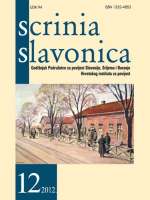“Nitko nam ne može pomoći, ako si ne pomognemo sami!” - Zdravstvene (ne)prilike češke i slovačke manjine u međuratnoj Jugoslaviji (1918.-1941.)
“Nobody can help us, unless we help ourselves!” - Healthcare situation and problems of the Czech and Slovak minorities in interwar Yugoslavia (1918-
Author(s): Vlatka DugačkiSubject(s): History
Published by: Hrvatski institut za povijest
Keywords: Czech and Slovak minorities; healthcare; Kingdom of Serbs; Croats and Slovenes; Kingdom of Yugoslavia
Summary/Abstract: This work takes an interest in the healthcare, hygienic and social problems among the members of the Czech and Slovak minorities based on archival documents stored in the National Archive in Bjelovar, the National Archive in Osijek and the Croatian National Archive in Zagreb, Czech and Slovak minorities’ newspapers, as well as annual reports of the Slovak National Secondary Modern School in Bački Petrovac. The problems that the members of the Czech and Slovak minorities were facing were not different from those that the domicile rural population was exposed to. Underdeveloped economy and backwardness, accompanied with tuberculosis, were affecting everybody the same. Along with chronic and infectious diseases, alcohol was the basic social problem of that period. Against its abuse members of both minorities fought with educational lectures, advices and adverts in the newspapers, as well as with publishing books on the subject in their mother tongue. Wanting the guidelines of the healthcare education to be available to everyone, minority newspapers had sections dedicated to rural economy, households, hygiene, feeding habits and correct upbringing of children, while lectures were accompanied with fi lm projections dealing with healthcare and social problems, by which cinemas in local centres became an important segment in the battle for the health of the population. A major breakthrough was the fact that women were included in the healthcare education. Aside from being educated how to participate in anti-alcohol propaganda, by organizing women’s societies, aside from the education, keeping company and charitable work, their selfconfidence was also made stronger, which represented a considerable social shift. From all of the above, one can conclude that the members of the Czech and Slovak minorities were aware of the educational trends of the day, which they successfully applied in practice.
Journal: Scrinia Slavonica
- Issue Year: 2012
- Issue No: 12
- Page Range: 241-269
- Page Count: 29
- Language: Croatian

